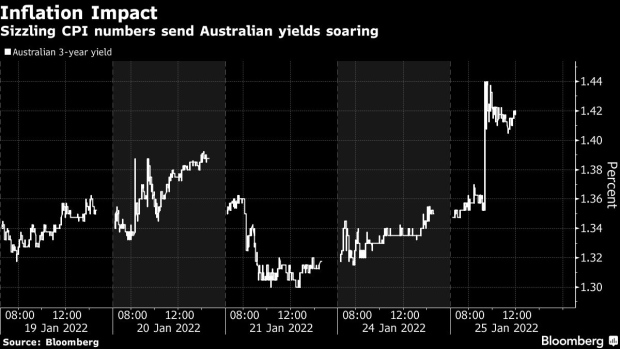Jan 24, 2022
Market Swings Build as Inflation Pushes Central Banks to Action
, Bloomberg News

(Bloomberg) -- Global traders already on tenterhooks over this week’s key Federal Reserve meeting had their nerves frazzled further Tuesday by Australian inflation data that smashed expectations, a surprise monetary tightening in Singapore and further volatility in U.S. equity futures.
The hawkish move in Asia and a strengthening of bets on rate hikes in Australia reflected the trend of higher inflation triggering tighter monetary policy that has upended risk assets this year and sent bond yields soaring. Investors are bracing for the impact of Wednesday’s Fed meeting on expectations for U.S. rate hikes that could trigger fresh swings in global assets.
A maelstrom of volatility in the past 24 hours saw almost $3 trillion wiped off the global stock market before a reversal dragged U.S. benchmarks back into the green on Monday. Australia’s three-year bond yield jumped to the highest since April 2019 on rising core consumer prices, while the Singapore dollar strengthened to the highest since October after the central bank reacted to inflation at an 8-year high by unexpectedly tightening policy.
“Markets are second guessing the timing and magnitude of rate rises by the Fed -- investors were already hypersensitive in the past week and the latest events are certainly not helping,” said George Boubouras, head of research at K2 Asset Management in Melbourne. “It’s all led by the Fed, and it’s still a very risky period for markets.”
Investor jitters show few signs of abating, with U.S. equity futures resuming recent declines on Tuesday following the sharp swings Monday and Asian stocks tumbling to a 13-month low. Treasuries gained with the yen as investors sought out havens.
“We’ll probably see further disruptions over the next few weeks” from omicron’s impact on inflation, economic activity and financial markets, said Marcel Thieliant, senior economist at Capital Economics in Singapore.
Some, including Bank of New York Mellon’s Wee Khoon Chong, are more optimistic that market swings could be contained at least in Asia.
“The recent volatility I think is quite a typical market reaction to how the monetary policy cycle has turned,” said Chong, senior market strategist in Hong Kong. “Asia inflation is still low in absolute terms but is rising gradually.”
(Updates throughout)
©2022 Bloomberg L.P.